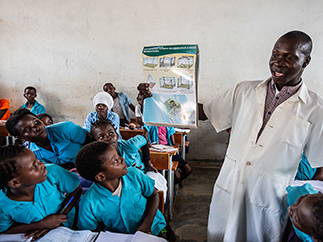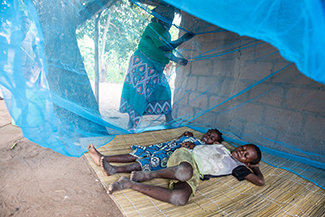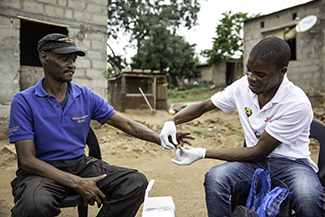consent_cookie
Duración: 1 year
Stores the user's cookie consent state
24-04-2020
World Malaria Day, which takes place on 25 April each year, is an internationally recognized day, highlighting the global efforts to control malaria and celebrating the gains that have been made. Since 2000, the world has made historic progress against malaria, saving millions of lives. However, half the world is still at risk of this preventable, treatable disease, which costs a child’s life every two minutes.
The global theme for World Malaria Day, ‘Zero Malaria Starts with Me’, emphasizes everyone’s power and responsibility – no matter where they live – to ensure no one dies from a mosquito bite. Malaria is increasingly becoming a disease of poverty and inequity, with the most vulnerable at greatest risk of dying from a mosquito bite, particularly pregnant women and children under five in sub-Saharan Africa.
According to the World Malaria Report 2019, nearly 900,000 children in 38 African countries were born with a low birth weight due to malaria in pregnancy in 2018, and children under five still accounted for two-thirds of all malaria deaths worldwide.
Humana People to People is committed to eliminate malaria in the high incidence countries
Humana People to People implements malaria projects in cooperation with partners who are driven by the same ambition of eliminating the treatable disease. In fighting malaria we do community mobilization for prevention and treatment including distribution of mosquito-nets. Through a network of community-based health workers and community volunteers, members of Humana People to People organise malaria awareness campaigns, distribute mosquito-nets, carry-out malaria testing, treat and refer the sick for treatment at health centres. Tracking of malaria cases is done to support treatment. Targeting individuals, families and communities is part of reaching out activities; so gaining control and eliminating malaria becomes every-one’s responsibility. Simple actions people can take to prevent contracting malaria are shared through village meetings, school-based awareness raising and house-to-house visits.
During the year 2019, Humana People to People reached more than 2.3 million people with malaria awareness for prevention messages with more than 420 000 people getting tested. Those found infected received treatment at temporary clinic posts established whilst others were treated at health centers. Some of the Humana People to People mega malaria interventions currently reaching hundreds of thousands of people are being implemented in Mozambique and the Democratic Republic of the Congo. ADPP Mozambique currently is implementing a malaria project covering more than 1.3 million in hard hit communities of the provinces of Niassa and Nampula provinces of Mozambique. Humana People to People-Congo started a new malaria project in July 2019 reaching more than 313 000 people in Mai Ndombe province of Democratic Republic of Congo. Three Child Aid projects in South Africa are involving more than 200 000 people with malaria awareness, testing and treatment activities along the South African border with Mozambique and Swaziland. The goal of the projects is to reduce malaria cases to zero through eradicating the breeding sites for the female anopheles’ mosquito which transmits the malaria parasite.
Distribution of treated mosquito nets is being done, especially to pregnant women and children below five years of age in Zambia, Botswana, Zimbabwe, Guinea Bissau, Malawi, Namibia, South Africa, Angola, Mozambique and the Democratic Republic of Congo. The teachers at the Humana People to People Teacher Training Colleges, Community Health Agents, Outreach Officers, Area Leaders and volunteers form part of mosquito-nets distribution network. Malaria prevention is a crucial part of the Humana People to People projects where each employee and the people involved in the projects are informed and equipped to prevent it.
Multi-country malaria elimination programmes lead by ADPP Mozambique
Members of Humana People to People are participating in two multi-country malaria elimination programmes lead by ADPP Mozambique in one major block and another two country programme is lead by ADPP Angola. The Southern Africa Malaria Elimination Initiative 8 (E8) is a coalition of eight countries; Angola, Botswana, Eswatini, Mozambique, Namibia, South Africa, Zambia and Zimbabwe, who are working across national borders to eliminate malaria in the sub-region by 2030. As the malaria response arm of the Southern Africa Development Community (SADC), the E8 is pioneering an ambitious regional approach and driving collective action to end this deadly disease. The E8 initiative is funded by The Global Fund to Fight AIDS, Tuberculosis and Malaria.


